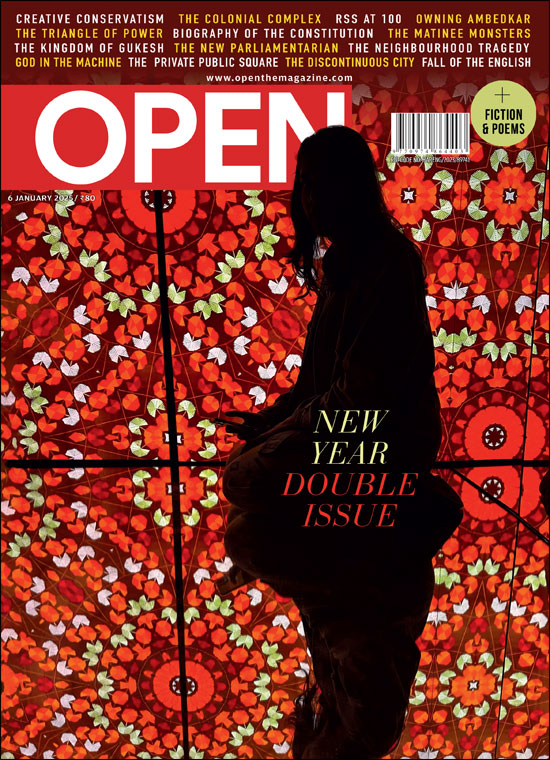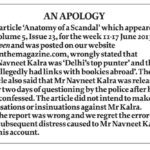Sonia: The Material Girl
Life inside the charmed circle of the Gandhis
 Tavleen Singh
Tavleen Singh
 Tavleen Singh
|
21 Nov, 2012
Tavleen Singh
|
21 Nov, 2012
/wp-content/uploads/2015/11/sonia1.jpg)
Life inside the charmed circle of the Gandhis
During the Emergency, my social life seemed to become an endless series of dinner parties. The city had not extended as much as it has today. If we travelled to the still unfinished colonies of Shanti Niketan and Vasant Vihar, it was considered a long way. Vicky Bharat Ram lived in Shanti Niketan and I found myself invited to his house quite a lot. At his dinner parties there were nearly always the same people. One of them was Romi Chopra, who remains a devotee of the Gandhi family to this day. I remember him from those evenings as a shy, effeminate man. Someone who knew him from his Cambridge days once told me that he had wanted to become a ballet dancer but had ended up working for an advertising company in Delhi. When Rajiv and Sonia were not present he would talk to me about politics, but his political views were limited to the unashamed, unstinting, unquestioning worship of Mrs Gandhi. In his eyes she could do no wrong and the Nehru-Gandhi family had a divine right to rule India forever and ever.
Vicky I remember as being full of bluster and social conversation. He was a lot richer than the rest of us, so at his dinner parties he would serve French wine and fine Scotch whisky at a time when Mrs Gandhi’s socialist economic policies made these things almost impossible to acquire. He was married at the time to a beautiful Mexican woman who hardly ever came to Delhi. This did not deter Vicky from giving wonderful parties in his house filled with antique Indian sculpture and exquisite paintings. His family was famous for their contribution to Delhi’s culture and some of the finest private concerts I have attended were in Vicky’s father’s house.
Another couple who were regular guests at these dinner parties were Satish Sharma and his foreigner wife, Sterre. She was blonde and spent most of the evenings chatting to Sonia. Satish Sharma was a surly, silent man who did not seem to have much to say. He came from a middle-class background and had not been at either school or university with Rajiv and his other friends. Satish worked for Indian Airlines and it was through flying together that Rajiv and he had become friends. He gave no indication that he was even slightly interested in politics or current affairs. If someone had predicted that he would one day become an MP from Indira Gandhi’s constituency, Rae Bareli, and a cabinet minister, it would have been taken as a joke.
The other close friends who were present at these gatherings when they were in town were Nina and Arun Singh, and Suman and Manju Dubey. Of them Nina was the most likeable because of her friendly, open nature. Arun, or Roon, as everyone called him, was impossible to talk to because of his forbidding reserve. I knew of Suman from journalistic circles, in which he was respected for having got himself a very well-paid job with a newspaper in Singapore or Hong Kong. Indian journalism in those days consisted of a handful of English newspapers, with a small circulation and big influence, and a handful of Hindi newspapers that had a larger circulation but little influence, and any journalist who could get a job in a foreign newspaper was hugely admired. Suman was fidgety and nervous and seemed permanently distracted, while his wife, Manju, was a legendary beauty but had about her a cold, supercilious air. Another couple I remember as being part of Rajiv and Sonia’s inner circle were Nimal and Thud. I never found out his real name because everyone called him Thud, short for his surname, Thadani. It was only after Rajiv became prime minister and Thud became well known as one of his close friends that I discovered that his first name was Mohan. His wife was a plump, blowsy former airline stewardess who looked as if she may once have been pretty.
Then there were the foreign friends with whom Sonia seemed most comfortable and relaxed. Ottavio and Maria Quattrocchi were the ones who were nearly always invited where Rajiv and Sonia went. Not much was known about them, except that Ottavio worked for an Italian company and lived in Friends Colony. Sonia’s parents stayed with them when they came to Delhi. The other foreign friends came and went. There were Teresa and Brewster, whose surname I no longer remember, who lived in Marbella and had been introduced to Rajiv and Sonia by Mohammed Yunus, one of the Gandhi family’s closest friends. Yunus was a tall, talkative Pathan who, during the Emergency, became one of Mrs Gandhi’s most vociferous spokesmen. Teresa was very glamorous and always dressed in the latest clothes by Yves Saint Laurent or whoever was the designer of the season, and Brewster was a tall, bald ex-model. They disappeared soon after the Emergency ended, when it was discovered that they were involved in smuggling antiques out of India. There were other foreigners who came and went but were too itinerant to be important.
Drifting in and out of this inner circle of friends would be the occasional prince from Rajasthan or Punjab, a business tycoon or two from Bombay and other friends of Rajiv from Doon School. It was a closed circle of people who lived an upper middle class Indian existence. Nobody spoke Hindi well but that did not matter. What mattered was if you spoke the sort of English you may have learned in a public school in Dehra Dun. If some newly rich businessman drifted by, speaking English with difficulty, he was instantly treated as an object of fun.
Sonia did not speak English well but because she was a foreigner it did not matter. We were deeply impressed by all things foreign not just because we had been ruled by White men for so long but because secretly we believed that Western culture and civilization was superior to ours. It may sound like a funny thing to say, but Sonia’s foreignness made it easier for her to be accepted in Rajiv’s circle of friends. Had he married an Indian woman of her background, she would have been permanently held in contempt by the broken-down aristocrats and aspiring grandees who were Rajiv’s closest friends.
It is an indication of how deracinated our little set was, how removed from even popular Indian culture, that we did not notice that a few weeks after the Emergency was declared, a film called Sholay was released and made history as the biggest hit ever from the Bombay film industry. Rajiv’s childhood friend, Amitabh Bachchan, was one of the stars of the film and would go on to play a political role when Rajiv became prime minister.
Without exchanging more than a few words with Sonia during the Emergency, I noticed that none of the Indian women in what was considered her inner circle of friends were ever informal with her, except Nina, Arun Singh’s wife, and she was not in Delhi much. The other ladies seemed to be in awe of Sonia and their simpering attempts to make conversation always seemed, at least to me, to be stilted and false. Sonia guarded her privacy fiercely and this gave her a reserve that was forbidding. I remember just one instance of trying to engage her in conversation at this time at one of Vicky’s dinner parties. I asked her if she had ever missed Italy after coming to live in India and her answer was, ‘No. Not at all. Sometimes maybe some food… some kinds of bread.’ She made it so clear that she was not interested in the conversation going any further that I scuttled off and found someone easier to talk to. I personally found Sonia as foreign as any foreigner I had ever met. In those days she never wore Indian clothes, and was always in skirts or frocks, which added to the impression that she was different from the rest of us.
One thing I gathered from overhearing a conversation she had with the ladies who surrounded her was that she seemed terrified of India in a deep, deep way. It was summer and there must have been a new outbreak of malaria that the ladies were talking about. I heard Sonia say that when her children were babies she was so worried about them being bitten by mosquitoes that she would put anti-mosquito coils under their cradles. She only stopped when the family doctor told her that they were more in danger from the smoke of the repellent than from mosquitoes. None of the ladies found the story funny. None of them had the courage to tell her that when you grow up in India, you learn to live with mosquitoes just as you learn to live with undrinkable water in your taps, filthy streets, flies and an unreliable supply of electricity.
Another memory I have of Rajiv and Sonia in the Emergency days was when a group of us went to Tabela after a dinner party. Romi Chopra was in the group and Sonia’s brother-in-law Waltair Vinci, who worked for Fiat in Italy. We were too early for Tabela to be open, so as we sat on loungers by the Oberoi pool and I heard Sonia’s brother-in-law chatting to her in Italian with an informality that was refreshing. I think he asked her to come and dance with him and she said, ‘Doppo’ which someone translated for me as ‘later’. There was no dancing, though, and neither Rajiv nor Sonia ever drank anything stronger than juice while the rest of us drank what we could get from the bootlegger.
It was from the group of friends that surrounded them that I got to know more about Rajiv and Sonia. These friends loved talking about their friendship with Rajiv and Sonia and competed with each other to show how close they were. I learned from them that Sonia hated politics and politicians and was very loyal to her friends, and that Rajiv was a ‘very good person’. When I asked for an example of his goodness, I was told, more than once, that Rajiv saw a beggar in rags on a cold night and immediately stopped his car and gave him his own coat.
It was just after Mrs Gandhi’s defeat, while a jubilant Janata Party government was taking over in Delhi under Morarji Desai, that I met Akbar Ahmed. He was better known by his nickname Dumpy though I have always called him Akbar. He was introduced to me at a dinner party in Oberoi Hotel as ‘Sanjay Gandhi’s best friend’. I took an instant liking to Akbar because of his ability to laugh at the most serious things and because he admitted without hesitation that he did not know how he had wound up in politics. At our first meeting he told me he had been studying chartered accountancy in London throughout the Emergency and had returned just before the elections were announced. He ended up helping Sanjay Gandhi with his campaign to win his first Lok Sabha election from Amethi at the behest of a senior politician in the Congress Party. ‘Weren’t you friends in Doon School? Shouldn’t you be helping him?’ He was in Lucknow, he said, not doing very much and with Amethi so close by he just drove down and offered his help.
When I got to know Akbar better I discovered that his best quality was his ability to give unstinting loyalty and friendship. After the defeat in 1977, when many of the sycophants around the Gandhi family vanished quietly into the Delhi night, Akbar felt it was his duty to be as much of a friend to them in every possible way. Even if he had no work with Sanjay he went and saw him nearly every day. He told me that after they moved to 12 Willingdon Crescent, the house Mrs Gandhi was allotted after her defeat, the family lived in considerably reduced circumstances. Mrs Gandhi was not known to have made any money for herself when she was prime minister and the party funds vanished with as much speed as the sycophants.
From Akbar I learned that after the defeat Mrs Gandhi was so shaken that she had seriously considered retiring to a cottage in the hills to write her memoirs. She thought this would be a good way to escape any political retribution that the Janata government may have been contemplating. According to Akbar, it was because Sanjay Gandhi insisted that they stay to fight another day that Mrs Gandhi did not leave Delhi. Sanjay became her pillar of support and consolidated what remained of the Congress Party. Mrs Gandhi seemed lost and defeated. I remember running into her at obscure diplomatic parties and once even at some non-event in Sapru House. Her presence was often an embarrassment at these events because it meant that the host or hostess would have to be in permanent attendance. Ordinary socialites were too overwhelmed to chat to her and diplomats and bureaucrats too intimidated. The occasional journalist would go up and ask a question or two but she did not like journalists and made this clear by responding to most questions in curt monosyllables.
It was Akbar who first told me that there were serious domestic tensions in Mrs Gandhi’s household. Since 12 Willingdon Crescent was not very far from my parents’ home, he would drop by, often full of stories and gossip. One evening when he settled down with his glass of Scotch whisky on my veranda, he told me that Rajiv and Sonia blamed Sanjay for everything that had gone wrong and that they never tried to hide their feelings about this. Tensions ran so high that the smallest trigger could set Sonia off, Akbar said. There was a particular story about a fight over dog biscuits that I remember well.
This is how Akbar told the story. ‘Yaar, can you imagine anyone getting upset because some dog biscuits got eaten by the wrong dog? What happened was that Maneka saw these biscuits in the fridge and fed them to her dogs and Sonia had a screaming fit. Then Rajiv started screaming too and it was all very unpleasant. Apparently they were imported dog biscuits or something. But, they were just dog biscuits, yaar.’
The first time I met Rajiv after he became a politician was at a dinner party in one of the usual drawing rooms. I cannot remember where it was or who else was there, but it was a small enough gathering for Rajiv and Sonia to be able to talk freely about what they had seen in Amethi. He looked both elated and a little confused, and she seemed quite overwhelmed. I report the following conversation from memory. My recollection remains vivid enough for me to be able to recount it almost verbatim.
‘The real shock is the poverty,’ Rajiv said. ‘I know I should have realized that we are a poor country and that means there would be poverty. And it’s not that I haven’t seen it in the faces of beggars and street children in Delhi. But in the villages it really is something else… beyond anything I had imagined.’
Sonia was appalled by the filth she had seen in the villages. It made her unusually eloquent. ‘In one hut we saw a small baby crawling around right next to this large pile of cow dung. He was playing with it and putting it in his mouth. It was awful and I wanted to tell his mother to stop him from doing this, but I thought she would mind so I said nothing.’
‘It’s better not to interfere in local customs,’ said one of the ladies, sipping delicately at her Campari-soda.
‘We heard from a health worker in one village that the main reason why newborn babies die from tetanus is because midwives put cow dung on their belly buttons to dry up the cord. Can you imagine?’
‘Well, that is the practice…’ someone said.
‘They have nothing,’ Rajiv continued. ‘The women have never seen the inside of a hospital. The men depend on what they can earn from the land, and that isn’t much. I can’t believe that they live without something so basic as clean water.’
‘Indians believe in karma,’ one of the men said, ‘and that makes them believe it is their fate to be poor, that they must have done something bad in their last life to suffer in this one.’
In the first few months after Rajiv became prime minister, Sonia spent most of her time decorating the new house on Race Course Road. Mrs Gandhi’s old home opposite the Gymkhana Club was now hallowed ground. So many people came to see where she had been killed and where she had lived that it became necessary to turn her home into a memorial. A walkway of crystal was created where she took her last steps and her room was preserved as she left it on the last day of her life. Two large bungalows were found on the other side of Gymkhana Club, on Race Course Road, for the new prime minister to live in. They were large government bungalows with gardens on all four sides, but because politicians liked living in Gandhian austerity, the houses and gardens had fallen into a state of decay. Sonia spent the first few months of 1985 making improvements to her new home and after that amused herself in the long hours that Rajiv was away by learning to restore old paintings in the National Museum.
Sonia seemed to play no political role, but where social matters were concerned she played an increasingly important one.
She began a process of weeding out from Rajiv’s inner circle people whom she considered unsuitable or those she took a sudden dislike to. Among the first to go was Nina. As far as I knew Sonia had continued to see Nina for long lunches nearly every day, so it came as a shock when I first heard there was trouble between them. Arun and Nina were so close to Rajiv and Sonia that they were given a house on Race Course Road next door to the prime minister’s new residence. A small gate in the dividing wall made it possible for them to go to each other’s houses without needing to go out of the main gates. The first rumour I heard, not long after the meeting at Mapu’s with Nina and Sonia, was that Sonia had locked the gate on her side of the wall.
Nobody knew why this had happened and none of their close friends talked about the closing of the gate. I did not know Nina well enough then to ask her straight out, and Mapu was too discreet to open his mouth about anything connected with his family. But in Delhi’s drawing rooms gossip had it that Nina had been dropped because she was too outspoken and Arun too moralistic about anything to do with collecting money for political purposes. He had always made it clear, people said, that he would help Rajiv with his politics as long as he was never expected to handle party funds.
Arun continued to work for Rajiv’s government till the Bofors scandal broke but he and Nina were no longer included in the intimate social circle that surrounded Rajiv and Sonia. In this circle were Amitabh Bachchan, now a Member of Parlia- ment from Allahabad, his wife Jaya, his brother Ajitabh and Ajitabh’s wife, Ramola, Satish Sharma and his wife, Sterre. The closest to Rajiv and Sonia were Ottavio and Maria Quattrocchi. When Mrs Gandhi was alive she discouraged her daughter-in-law from inviting foreigners to the house, so the Quattrocchis were kept at some distance from the prime minister’s residence. But after Rajiv became prime minister, the Quattrocchis had privileged access to the new house on Race Course Road. There were stories, spread by the prime minister’s security guards, that when one of them had tried to use a metal detector on Mrs Quattrocchi during a routine security check, she had kicked him and thrown a tantrum.
From the old inner circle, Romi, Vicky, Nimal and Thud, and sundry others remained. But the cosy lunches and dinners of yore came to a swift end once Rajiv became prime minister. If the Gandhis entertained at all it was for official events. I heard of dinners for visiting celebrities that were carefully choreographed by Sonia to give them an elegance social events by the Government of India lacked. Meals started to come course by course instead of all jumbled together and from those who attended these dinners came tales of a European touch to the food.
By Rajiv’s second year in power, stories about Sonia’s shopping sprees began to circulate in Delhi’s drawing rooms. The most dangerous gossips in Delhi are traditionally the sellers of shawls and carpets who wander from house to house with their wares. So it was from a Kashmiri shawl-seller that I first heard that the prime minister’s wife was buying shahtoosh shawls in large quantities. It was not an environmental crime then to wear shahtoosh but to buy a shahtoosh shawl was the equivalent of buying expensive fur. Only very rich Indians could afford to. Then, from diplomatic sources in distant Moscow, where the prime minister and his wife made their first foreign visit, came the story of Sonia buying an expensive sable coat. In Mrs Gandhi’s time, this kind of personal expenditure would either not have happened or would have happened so discreetly that nobody ever found out. Sonia’s sable coat travelled back on the prime minister’s flight, and people saw it and talked about it. According to the story I heard, Sonia’s taste in fur coats was so refined that she was not satisfied with Soviet tailoring and had the coat sent to Rome to be redesigned by Italian fashion house Fendi. These were the stories that are never possible to confirm, but gossip rarely needs confirmation to be believed.
Other small sartorial signs of a gradual move away from ‘socialism’ soon became evident. Rajiv started to wear an expensive, gold Rolex watch and carry a Mont Blanc pen in the pocket of his humble khadi kurta. This elegant new touch was imitated instantly by other young members of the Congress party. The style was not just imitated but embellished. Suddenly it became fashionable to add a pair of Gucci loafers to clothes made of Gandhian khadi. India had been through so many decades of enforced socialist behaviour that in the eighties there were not many Indians who would have recognized international designer labels. Certainly, there were no journalists in Delhi who had any acquaintance with them but what they did start to notice soon was that Rajiv’s friends were all doing very well for themselves. Rumours of crony capitalism, an expression we only half understood then, started to spread. Contracts to export rice to the Soviet Union were said to have been handed to some of their friends and all sorts of other deals to others.
To those of us who still saw Rajiv and Sonia’s friends in the drawing rooms of Delhi, it was instantly obvious that they suddenly had a lot of money. No longer did they travel economy when they went abroad and no longer did they stay with friends in London and New York. They stayed in expensive hotels and this was so new and wondrous an experience for them that they liked slipping names like Claridges and the Meurice into accounts of their travels. I remember on a trip to Washington being astounded to discover that one of Rajiv’s poorest friends spent a month occupying two suites in Watergate hotel. Friends of Rajiv who had lived on salaries that barely enabled them to afford a small Indian car now drove around in foreign cars and in their drawing rooms suddenly appeared expensive works of art and antiques. Nobody asked too many questions because Rajiv was still very popular but rumours of ‘deals’ started to filter into newspaper offices.
Years later, when Sonia Gandhi became the most powerful political leader in India, she tried to distance herself from the Quattrocchis by pretending that she barely knew them. But in the year that the Bofors scandal shattered Rajiv’s image of being Mr Clean, everyone from Delhi’s drawing rooms to its corridors of power knew that the Quattrocchis were as close to the Gandhis as it was possible to be. They went on holidays together and Quattrocchi liked to flaunt his closeness to the prime minister. At dinner parties he was often heard boasting about his influence with Rajiv’s government and those to whom he boasted did not hesitate to spread the word around because the Quattrocchis were not popular in Delhi’s social circles. They were not a pleasant couple. Ottavio was loud and full of bluster, and Maria had a coarse, bossy manner. If they were invited everywhere it was only because of their obvious closeness to Rajiv and Sonia.
I remember a dinner party in the house of an American diplomat at which an uncle of mine, who lived in the US, took me aside and asked me if I knew someone called Ottavio Quattrocchi. When I asked why, he said, ‘He just came up to me and said he was so close to the Gandhi family, that he could arrange for me to get government contracts.’ My uncle was with a big Am- erican construction company. Was I surprised by what he told me? Not at all, because I had heard such stories many times before. Was I surprised the Quattrocchis were using their proximity to the Gandhis to peddle influence? Not at all. What did surprise me was the manner in which Rajiv handled the Bofors scandal. Since there was no evidence then, or even at the end of endless inquiry commissions, that linked the bribes to him or his family why did he behave like a thief caught in the act?

/wp-content/uploads/2024/12/Cover_Double-Issue-Spl.jpg)











More Columns
Sensex Or Gold: Which Will Hit The 1-Lakh Mark In 2025? Short Post
Moscow's Misdirection on Azeri Plane Crash Sudeep Paul
Consumption gap between rural and urban India fell in 2023-24: Survey Open